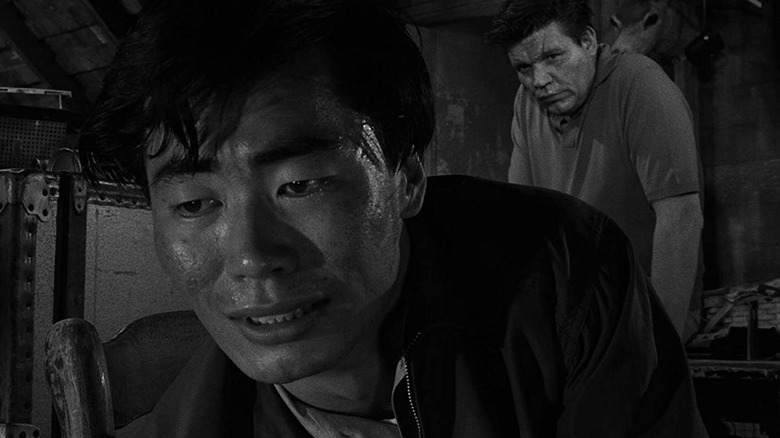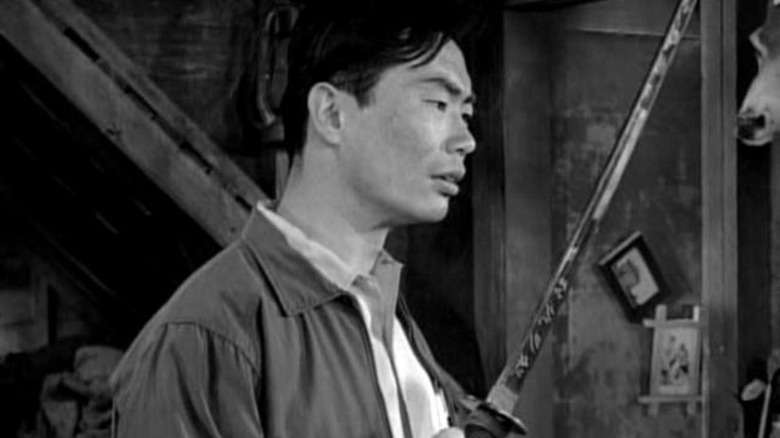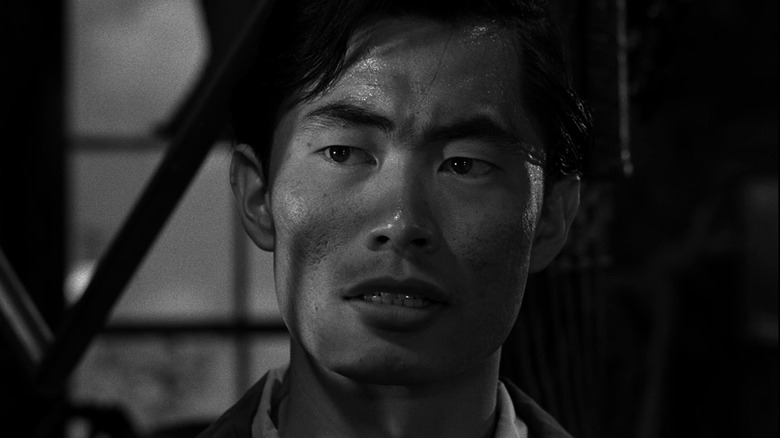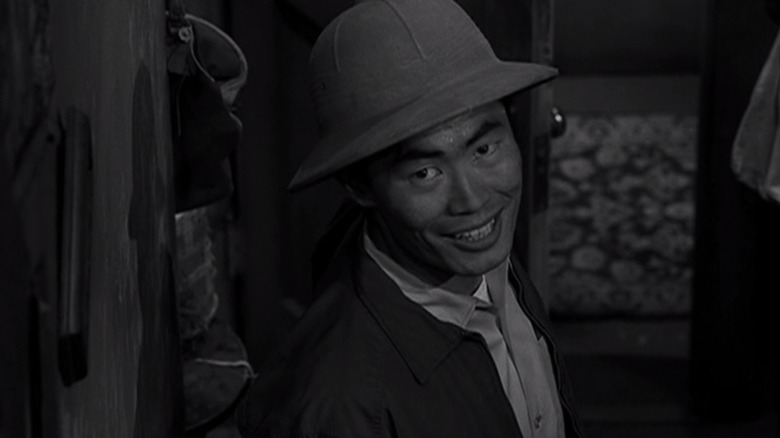Why George Takei's Twilight Zone Appearance Went Unaired For Decades
"Two men alone in an attic, a young Japanese-American and a seasoned veteran of yesterday's war. It's twenty odd years since Pearl Harbor, but two ancient opponents are moving into position for a battle in an attic crammed with skeletons, souvenirs, mementos, old uniforms, and rusted medals. Ghosts from the dim reaches of the past, that will lead us into the Twilight Zone."
So goes Rod Serling's opening narration for "The Encounter," an episode of "The Twilight Zone" that aired on May 1, 1964, right near the original show's end. In it, a Caucasian WWII veteran (Neville Brand) sits in his attic, reminiscing about his time as a soldier — he handles a Japanese sword which he claimed as a battlefield souvenir nearly a decade earlier — when a second man (George Takei), a child during WWII, crawls up into the small room asking about a potential job a neighbor had suggested. The Brand character speaks in a condescending, racist way to the Takei character. The sword is handled a lot and talked to a lot. The weapon seems to possess all the animosity of the war inside of it.
Eventually, the Takei character will reveal that his father was one of the construction foremen when the base at Pearl Harbor was built, but that his father was ultimately a secret Japanese spy who instructed the invading planes where best to bomb in 1941. The Neville character admits that he is full of bigotry and hatred and the two men face off. The influence of the sword, however, gets the better of them with Takei accidentally killing Neville and then screaming "Banzai!" as he leaps out a window.
The Sword
The metaphor for "The Encounter" is clear: The hate and bigotry borne on the back of war will persist into new generations, even if the people involved didn't fight. The weapons of war are no mere trinkets, but haunted — in this case literally — by the spirit of violence. Serling wanted to show that in many ways, the war never ends.
One can also see just as easily how badly Serling whiffed it. Throughout the episode, Fenton the Neville character only sees the Takei character through the lens of his nationality. Takei's character is named Arthur, and Fenton expects him to behave in a stereotypically Japanese fashion as his superiors in the army taught him. Arthur, an American with no war experience, must face prejudice head-on, and his arc is presented as a battle with his "Japanese-ness." Arthur changed his name from Taro, for instance, implying that Arthur is denying something about his national heritage, or — much more insidiously — his "nature." It's worth noting that Takei also changed his name (from Hosato), was born in L.A., and was held in an American internment camp as a boy.
"The Encounter" ultimately transforms Arthur from a young man looking for work into someone who represents all of the worst prejudices about the Japanese people. If Serling's idea was to show that prejudice can force someone to behave in the way a racist expects them to, it's mishandled. Arthur is not given any agency, and the episode ultimately argues that Arthur really is little more than his "Japanese-ness." A 2021 essay in Bright Lights Film Journal, written by Raymond De Luca, eloquently explains in more depth.
The controversy
"The Encounter" was protested immediately upon its release, and CBS ultimately pulled the episode from syndication.
The episode came at a time in U.S. history when the government was only just beginning to acknowledge the crimes it committed against the Japanese people in America regarding the internment camps. In the 1960s, during larger Civil Rights struggles, a redress movement was formed to force the government to apologize and offer reparations. Anti-Asian sentiment was running hot, and an episode of TV that implied Japanese people are all instinctually overcome by samurai weapons and yell "Banzai" wasn't helping matters. The redress movement took many years to gain traction, and it wouldn't be until 1979 that bills and court cases would be enacted. It wouldn't be until 1986 that the Supreme Court would allow such a reparations case to be heard (the body had previously dismissed similar cases), and checks would not be issued until 1993.
"Two men in an attic, locked in mortal embrace. Their common bond, and their common enemy: guilt. A disease all too prevalent amongst men both in and out of The Twilight Zone."
Serling's grave intonations may sound poetic, but it was unfair to depict Arthur's guilt as being the same as Fenton's. A Japanese boy facing the crimes of his father is quite different from that of an American soldier who killed Japanese people. Equating the two is false, and it should be only Fenton who bears the guilt of wartime atrocities. Arthur, instead, had to contemplate his relationship with his father, facing that the man who raised him had done things that led to many deaths.
Unseen until 2016
"The Encounter" would not be seen on American television until 2016 when SyFy restored it to the show's lineup as part of a New Year's marathon (all-day "Twilight Zone" marathons were common on American television for decades, usually reserved for Thanksgiving Day or New Year's). It aired on January 2, right at 9 a.m., a time when the marathon was running its course.
It's certainly worth noting that "The Encounters" re-airing on TV occurred during the presidential campaign of Donald Trump who had, according to the timeline provided by Bright Lights, had only recently called for a ban against Muslims entering the United States (a ban he actually enacted a year later after his election). One cannot be sure if TV programmers wanted to show an episode about prejudice right when an overwhelmingly prejudiced candidate was running for office, but the timing is certainly good.
In "The Encounter," the Fenton character is depicted as a bigoted, right-wing war supporter who may admit to flaws, but who is ultimately overwhelmed by an "other." He longs for a time when he could be a soldier again, when he had value when fascism allowed him more opportunities. A time when Japanese people were clearly the enemies and he was thriving. In short, he wanted to make America great again.



